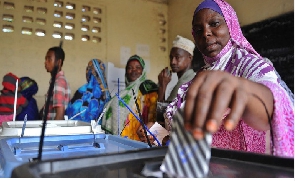 Tanzanians cast their votes during a past election
Tanzanians cast their votes during a past election
Political parties in Tanzania are not amused with the proposed changes to electoral laws, saying they give the president more say in constitution of electoral commission.
The proposals are contained in three Bills tabled in parliament on November 10 following pressure from opposition, seeking an independent electoral system to be in place ahead of the 2024 local government elections and presidential/parliamentary polls a year later.
Parliamentary debate on the Bills has been postponed until the next sitting in February 2024 pending scrutiny by a special House committee that will also involve public participation.
With the civic polls scheduled to be held in October of the same year, this will provide just eight months for the new legislation to be passed and become operational. The Bills that were presented in the House for first reading are the National Electoral Commission (Nec) Bill, Political Parties Affairs Laws (Amendment) Bill and the Presidential, Parliamentary and Local Government Elections Bill, all dated 2023.
This past week, several critics have asserted that the Nec Bill has contradictions by stating that the commission will be an "independent, autonomous organ whose decisions will not be interfered with" while at the same time including clauses that indicate the president will have the final say in who to admit as members.
The Bill introduces new procedures for people to apply for advertised vacancies in Nec and undergo rigorous interviews by a "special recruitment committee" instead of the commissioners being appointed directly by the president.
However, it also requires the committee to forward at least nine chosen names for the president to decide on the maximum five commissioners, while filling the positions of Nec chairperson and vice-chairperson remains the sole discretion of the head of state as expressly stipulated in Tanzania's constitution. The committee will also be mandated to interview applicants for the key post of director of elections, who has also hitherto been appointed directly by the president but unlike the commissioners is a salaried position.
But again, the Bill requires the director's qualifications to include being a senior civil service officer and the committee's nominee for the job to be subjected to presidential approval.
Reactions from political reforms proponents to these new provisions in the Nec Bill were generally despondent with opposition party the Civic United Front (CUF) saying it had failed to adequately address its primary concerns over the president’s overriding powers to control the entire Nec set-up.
"What we have witnessed is something we did not expect. In short, we have lost," CUF's deputy secretary-general Magdalena Sakaya stated.
Other parties continued to maintain a hardline stance that changes in election legislation were meaningless without first addressing potential conflicts between the new laws and the existing constitutional framework.
“First, we get a new constitution, or we decide to make small changes in the current constitution,” main opposition party Chadema said in a brief statement on its official X page.
ACT-Wazalendo leader Zitto Kabwe said the party will push for another Bill to make election laws favourable to all candidates.